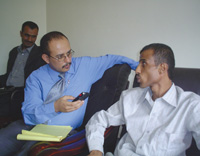
Hafidh Ibrahim, after his narrow escape from death sentence:”I will study at the Faculty of Law and Human Rights.” [Archives:2007/1101/Reportage]
November 8 2007
 |
Taiz Bureau
Hadfidh Ibrahim's case aroused large-scale interest among those interested in delinquents' issues. Ibrahim was sentenced to death for murder. The court insisted on carrying out the verdict, but both civil society and international organizations, including Amnesty International, as well as media outlets publicized the case.
Such intervention resulted in the court halting the death sentence. President Ali Abdullah Saleh ordered negotiations with the victim's blood relatives in order to settle their claim. It worked and the verdict was overturned, thus securing Ibrahim's release from prison. He immediately went to the Yemen Times Taiz bureau to give the following interview:
How long were you in the delinquents' prison?
I spent seven years there, since I was 12. Despite the fact that I was an underage delinquent, they put me in the general prison. I appeared in person before the court to be tried as a suspect below the legal age or even the age of puberty; however, they forged my age in the lawsuit. They put me in the Central Prison and sentenced me to death as well.
As a delinquent inside the prison, what were your impressions?
They treated me well, particularly the head of the prison, and allowed my family to visit me. I found some others the same age as me, so I acclimated to the living conditions inside the prison. I also was allowed to pursue my studies, earning a high school certificate with an 84 percent average.
Did your death sentence affect your concentration while studying?
First, I'd like to say that it was terrible. I was very confused because it was the first time to hear it. However, I trusted Allah and my attorney, who I was sure was very clever, professional and believed in my acquittal, so I kept in touch with him. For these reasons, the verdict didn't affect me while studying.
I want to continue my studies by studying law because I like that field and I saw the value of being a lawyer because such profession has a very important role in defending justice. Therefore, I'll study at the Faculty of Law and Human Rights because the legal profession is a noble one.
How did you feel when they overturned the death sentence?
It was an indescribable feeling. I felt like I was born again. I felt the value of life; it was priceless. I thanked God, who caused me to feel this and to know the value of being alive. I think most people don't know this, but when they are in the same situation as me, they'll realize it.
Additionally, I hope those attorneys who are unfaithful and disloyal to their profession will be placed in the same situation in order not to issue verdicts like mine until they verify and seek justice before issuing any such verdicts.
What do you plan to do after your release and what do you want others to do?
I'll pursue my studies by enrolling in university where I'll study law and human rights so that I can defend justice. I want others to put away their firearms, which lead to calamities, as it did in my case. My problems were caused by my carrying firearms, although I didn't mean for it to happen. For this reason, I call on all not to carry any type of firearms.
Additionally, I request the Yemeni government continue its campaign against carrying weapons in order to reduce this phenomenon. I also urge parents to prevent their children from doing so as well, so they won't be involved in such tragedies. Those who carry weapons may kill themselves or others by mistake.
I further demand suing judges and reforming Yemen's judiciary system because there is a lot of corruption there. Additionally, I demand encouraging the press due to its vital role in correcting the existing regime.
If the Yemen Times hadn't made a big deal of my case, I would have been executed because it was the Yemen Times' coverage that made them correct and review my case. Otherwise, I would have been a victim of corrupt judicial action. I want to promote such newspapers in order to follow up human rights issues, especially those involving children and delinquents.
Many people know nothing about their issues, so they become victims of illegal violations. If newspapers like the Yemen Times discovered and revealed the news, many things would be corrected. Therefore, I call on human rights organizations to support such newspapers because they can facilitate many of their humanitarian goals.
Do you have any message for civil society organizations?
I thank all of the civil society and human rights organizations for their support of me because they took a serious stand in my case and this is a great achievement. Special thanks to the Sisters Arab Forum, Amnesty International, the European Union, the French Embassy, the Yemen Times, President Saleh, attorney Essam A. Hamoud and those others who supported me.
Again, I call on human rights organizations to unite their efforts with newspapers in order to see their goals come to fruition; otherwise, there will be human rights violations.
——
[archive-e:1101-v:15-y:2007-d:2007-11-08-p:report]


